Table of content
Personality Types in Marketing: How They Shape Strategy and Success
Explore personality types in marketing, how Big 4 DISC and marketing personality types impact campaigns, audience engagement, and business growth.
Unlock the power of personality types in marketing to create campaigns that truly resonate and teams that thrive. By understanding DISC and other personality frameworks, marketers can craft messages that speak directly to their audience, anticipate behaviors, and drive engagement.
Whether you want to boost conversions, enhance collaboration, or tailor strategies with precision, leveraging personality insights is the key. Start exploring how personality-driven marketing can transform your results today.
What Are Personality Types in Marketing?
Personality types in marketing help brands connect with consumers based on their unique behaviors. Using insights from these types, companies can create targeted, engaging messages. The DISC personality model is a common tool that divides personalities into four categories:
- Dominant Personality Types – Assertive and goal-focused. Marketing should be direct, highlight efficiency, and emphasize results.
- Influential Personality Types – Social and enthusiastic. Marketing should inspire creativity and use vibrant visuals, testimonials, and social proof.
- Steady Personality Types – Value loyalty and stability. Marketing should emphasize trust, long-term relationships, and dependable service.
- Compliance Personality Types – Detail-oriented and logical. Marketing should be data-driven, offering well-researched facts and clear, accurate information.
By understanding personality for marketing through the DISC model, brands can better tailor their messaging, improve engagement, and increase conversions.

How Personality Influences Marketing Strategy
Understanding personality in marketing is essential for creating campaigns that genuinely resonate with diverse audiences. By integrating behavioral insights into marketing strategies, brands can enhance engagement, foster trust, and drive conversions.
Tailoring Marketing Campaigns to Different Personality Types
To create successful marketing campaigns, it’s essential to tailor content based on the specific needs and preferences of each personality types in marketing. DISC helps type of marketers identify these preferences and craft messages that resonate deeply with different segments:
D Personalities:
- Prefer direct and results-driven communication.
- Marketing strategies should focus on efficiency, speed, and competitive advantages.
- Use concise, bold messaging that emphasizes quick results and prestige.
I Personalities:
- Drawn to engaging and socially-driven content.
- Focus on creating vibrant visuals, exciting stories, and social proof.
- Incorporate testimonials, user-generated content, and messages that highlight lifestyle benefits.
S Personalities:
- Value security, stability, and trust.
- Content should highlight how your product/service provides comfort, reliability, and long-term satisfaction.
- Reassure them with testimonials, success stories, and calming, consistent messaging.
C Personalities:
- Prefer detailed, data-driven content.
- Provide in-depth product information, specifications, and case studies.
- Use statistics, third-party reviews, and logical arguments to build credibility.
Tailoring content to these personality types will ensure your campaigns are more effective, reaching the right audience with the right message.
How Personality Affects Marketing Collaboration
Awareness of personality types in marketing also enhances internal collaboration within marketing teams. Team members with different DISC profiles approach problem-solving, creativity, and communication differently.

Here’s how personality affects collaboration:
D Team Members:
- Be decisive, focused on results, and work quickly.
- Tend to take charge and push projects forward, but may overlook details.
C Team Members:
- Excel in brainstorming sessions, bringing creativity and energy to the table.
- Often play a key role in building team morale, generating enthusiasm, and encouraging collaboration.
I Team Members:
- Be focused on cooperation, relationships, and consistent communication.
- Provide support to ensure that the team works harmoniously, and they thrive in collaborative environments.
S Team Members:
- Be detail-oriented, analytical, and focused on accuracy.
- Ensure that the strategy is well-researched and that all data is accounted for in the decision-making process.
By understanding these dynamics, marketing teams can better align roles, minimize conflict, and ensure that everyone is playing to their strengths, which leads to more efficient and effective campaigns.
The Role of Personality in Consumer Behavior
Consumer decision-making is heavily influenced by personality types in marketing. Individuals process information and evaluate options based on their behavioral tendencies. Here’s how DISC shapes consumer decision-making:
D Consumers:
- Make decisions quickly and focus on results.
- Be drawn to products and services that promise immediate benefits or competitive advantages.
I Consumers:
- Value emotional appeal and social connection.
- Be influenced by testimonials, reviews, and stories that highlight how products or services enhance their lifestyle.
S Consumers:
- Seek stability, trust, and long-term satisfaction.
- Prefer products that offer reliability and comfort, and tend to stick with brands they trust.
C Consumers:
- Require detailed information and proof before making a purchase.
- Focus on data, specifications, and facts that justify their purchase decision.
Incorporating personality insights into your understanding of consumer behavior allows you to craft offers, calls-to-action, and product messaging that align with each consumer’s decision-making process. By addressing their unique needs, you can improve conversion rates and build stronger customer relationships.
The Four DISC Personality Traits in Marketing Explained
In marketing, understanding the personality of a marketer and the personality types of target audiences is essential for crafting strategies that resonate with diverse groups. The Big Five personality traits and DISC are both frameworks that help marketers categorize personalities. However, while the Big Five covers broader psychological traits, DISC focuses more on behavior in specific contexts, making it highly relevant for tailoring marketing strategies.
When applying the personality model to marketing, marketers assess characteristics like openness and neuroticism. However, DISC is particularly useful in identifying how people react in certain situations - specifically, how they interact with brands, products, and marketing campaigns. DISC categorizes personalities into four key traits, each influencing a consumer's purchasing behavior in distinct ways.
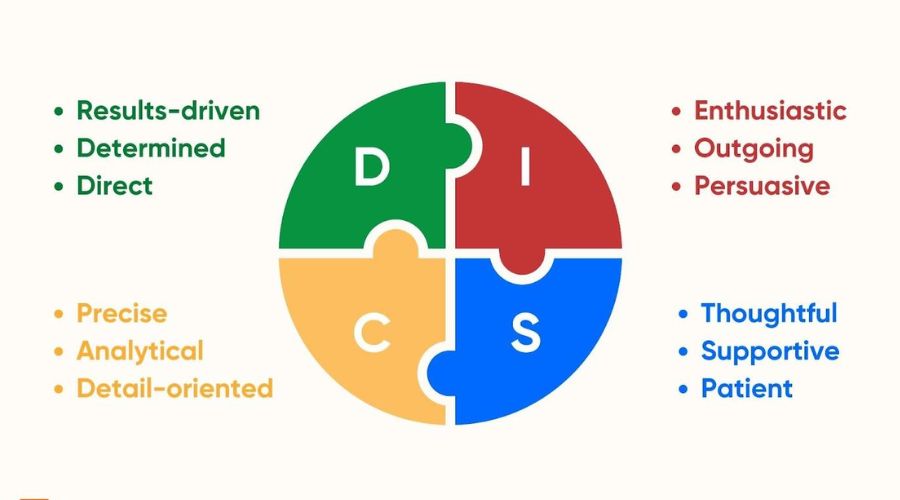
Dominance
- D personalities are direct, assertive, and driven by results. They prefer quick and impactful communication. When engaging a D-type, marketers should emphasize the bottom line, highlight competitive advantages, and demonstrate efficiency and fast results. These individuals are often decision-makers who appreciate content that reflects strength, decisiveness, and success.
- In marketing, to target D personalities, focus on bold messaging and use clear calls-to-action that demonstrate how your product or service can help them achieve their goals more quickly or outperform their competitors.
Influence
- Influential (I) personalities are social, enthusiastic, and thrive on excitement and interaction. They respond well to engaging visuals, stories, and social proof. When reaching out to an I personality, marketers should use creative campaigns filled with emotion, testimonials, and vibrant imagery. This personality type values connection, social experiences, and lifestyle enhancement.
- For marketing, I types love content that tells a story and offers experiences. Use user-generated content or influencer marketing to tap into their enthusiasm and social nature.
Steadiness
- S personalities value stability, consistency, and strong personal relationships. They tend to be loyal and supportive, preferring a calm, trust-based approach to decision-making. When marketing to S personalities, focus on messaging that emphasizes security, long-term satisfaction, and the trustworthiness of your brand.
- In marketing, to appeal to S types, incorporate customer testimonials, case studies, and clear customer support options. Show how your brand will provide a sense of comfort and reliability.
Compliance
- C personalities are analytical, detail-oriented, and prefer structured information. They make decisions based on logic, facts, and data. When crafting marketing campaigns for C types, it's essential to provide in-depth information, data-backed claims, and case studies that demonstrate how your product or service performs.
- To target C types, focus on offering clear product specifications, research data, and third-party reviews that validate your product’s quality and performance.
Using Personality Assessments in Marketing Teams
In the dynamic world of marketing, building a diverse and effective team is key to developing creative strategies that resonate with various audiences. By incorporating personality types in marketing, teams can better understand their strengths, communication styles, and how to collaborate more efficiently.
One powerful tool for achieving this is the DISC personality assessment, which enables professionals to identify the unique marketing personality traits and preferences of their team members.
DISC Assessments for Marketing Professionals
The DISC assessment categorizes individuals into four main personality types. When applied to marketing teams, DISC helps professionals understand their colleagues’ natural tendencies, decision-making styles, and ways of communicating.
- Dominant individuals are typically assertive and results-driven. They excel in leadership roles and enjoy challenges, making them ideal for positions that require decision-making and fast-paced action.
- Influential individuals are social and persuasive, thriving in environments that require interaction and the ability to inspire others. They excel in roles like content creation, social media management, and influencer collaborations.
- Steady individuals value stability and collaboration. They are great at building long-term relationships with clients and colleagues, making them perfect for account management, customer service, and team coordination.
- Compliance individuals are analytical and detail-oriented. They bring structure and precision to tasks like data analysis, research, and campaign optimization, ensuring that the team’s work is both effective and grounded in evidence.
By identifying these traits, teams can align responsibilities with the right individuals, creating a well-rounded and effective marketing unit. The DISC assessment fosters mutual understanding and helps teams work more harmoniously toward common goals.

Benefits of Personality Tests in Hiring and Retaining Marketing Talent
Incorporating personality tests like DISC into the hiring and retention process can have a significant impact on marketing teams. Here are the key benefits:
- Improved Hiring Decisions:
DISC helps hiring managers evaluate whether a candidate’s personality aligns with the demands of a particular role. For instance, hiring a D individual for a leadership position or a C individual for a research-based role increases the likelihood of job satisfaction and performance.
Understanding personality types ensures that candidates are placed in roles where they can thrive, resulting in higher job satisfaction and reduced turnover.
- Enhanced Team Collaboration:
With insights from personality tests, teams can better understand the communication preferences and working styles of their members. This creates an environment of mutual respect and reduces conflicts, fostering better collaboration.
For example, I personalities may need to work with C personalities to balance creativity with data-driven decision-making, ensuring campaigns are both engaging and effective.
- Retention and Engagement:
By understanding the personality traits of current employees, employers can create a work environment that caters to the needs of each type. Providing D personalities with challenging projects, allowing I personalities to engage in team activities, and offering S personalities job stability ensures that each individual feels valued.
C personalities may appreciate structured goals and opportunities for professional development. This personalized approach increases employee engagement and encourages long-term retention.
- Maximizing Team Strengths:
DISC assessments help identify not only potential areas for growth but also existing strengths within a team. By aligning team members with roles that leverage their natural talents and traits, marketing departments can operate more efficiently and produce high-quality, tailored campaigns that resonate with target audiences.
Conclusion
Understanding personality types in marketing is key to crafting campaigns that truly resonate and building a high-performing, collaborative team. By leveraging individual strengths and behavioral preferences, you can optimize messaging, enhance customer engagement, and drive sustainable business growth. Embrace DISC and other personality assessment tools today to unlock your team’s potential and see a tangible difference in how your marketing strategies connect with audiences.
FAQs
1. What personality type is good for marketing?
There is no single personality type that is universally best for marketing, as effective marketing relies on a combination of skills and traits. However, individuals with Influential (I) personalities often excel in creative roles, social engagement, and communication, while Dominant (D) personalities thrive in leadership, strategy, and decision-making. Steady (S) and Compliance (C) types contribute through reliability, attention to detail, and analytical thinking. Leveraging a diverse team with complementary DISC profiles ensures more innovative, well-rounded, and successful marketing campaigns.
2. Can different personality types work together in marketing teams?
Absolutely. Diverse personalities enhance creativity, problem-solving, and efficiency in marketing teams. D types drive results and decision-making, I types spark engagement, S types maintain stability and consistency, and C types ensure accuracy and analysis. Recognizing personality type in marketing helps managers align tasks with strengths, foster collaboration, reduce conflict, and create campaigns that balance creativity, strategy, and data-driven decisions.
3. How does personality type affect marketing strategy?
Personality types shape how marketers plan, communicate, and engage audiences. D types prefer direct, results-oriented messaging, I types favor vibrant, social content, S types focus on trust and loyalty, and C types emphasize logic and data.
Understanding personality type in marketing helps tailor campaigns to resonate with target audiences, select the right channels, and optimize messaging. Teams that consider personality in strategy development can increase engagement, improve conversions, and foster stronger customer relationships.


Don't Let Your Potential Stay Hidden!
Take the DISC test today and discover your unique 'YOU', with deep insights into your true personality and potential.
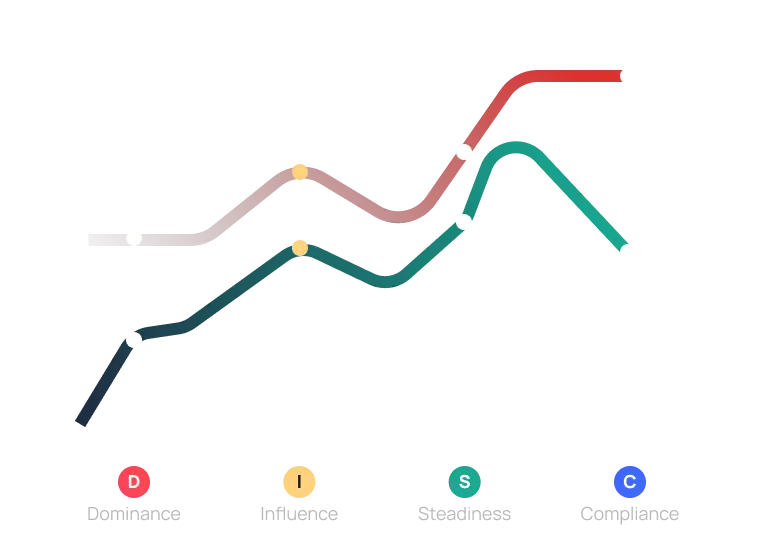
Represents your instinctive behaviors and desires.
Shows the behavioral tendencies you think you should exhibit in specific situations.
Related articles
You may also be interested in
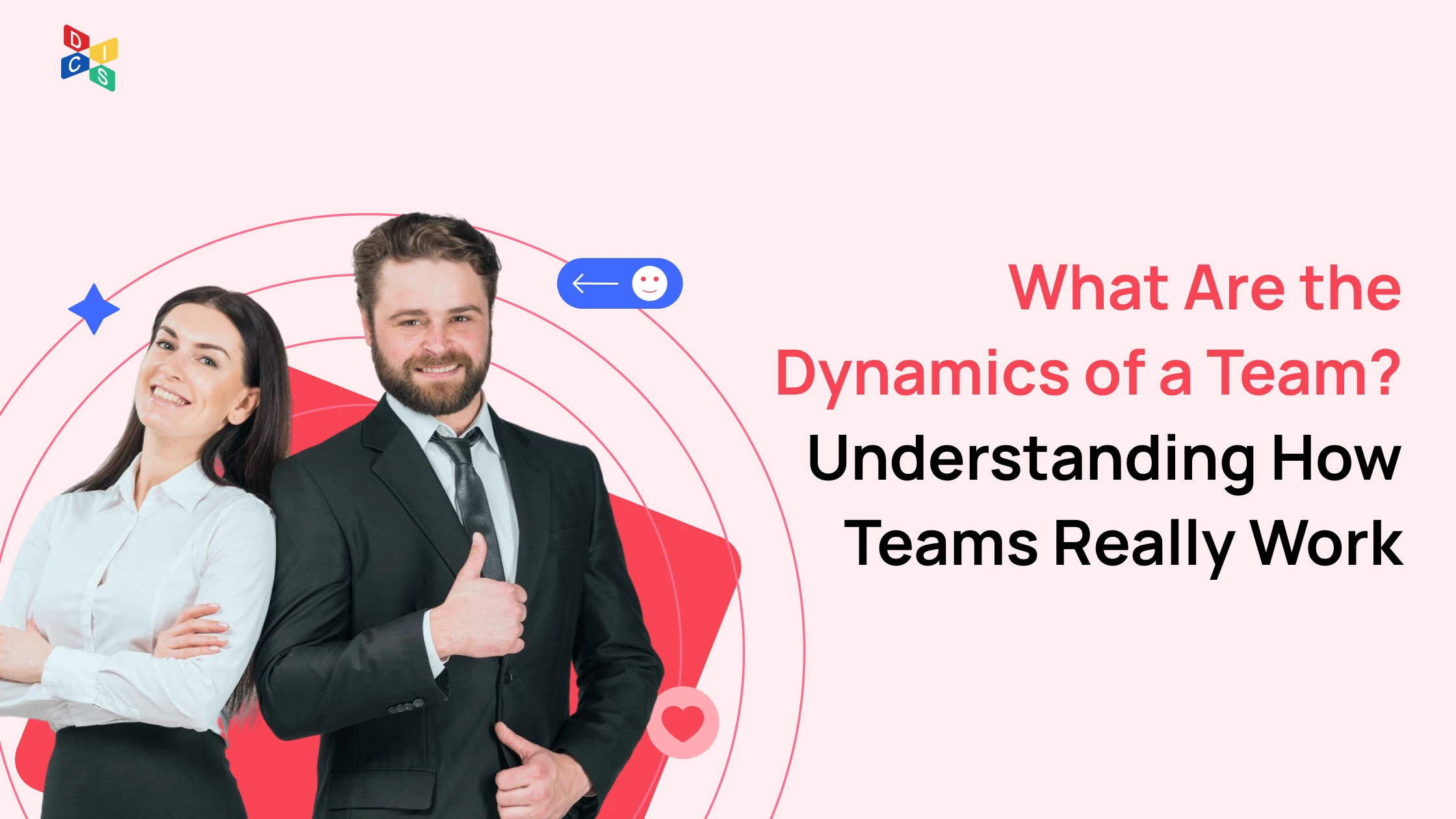 Self ExplorationDec 17, 2025
Self ExplorationDec 17, 2025What Are the Dynamics of a Team? Understanding How Teams Really Work
Discover what are the dynamics of a team and how they impact team performance. Learn how communication, roles & personality differences boost collaboration.
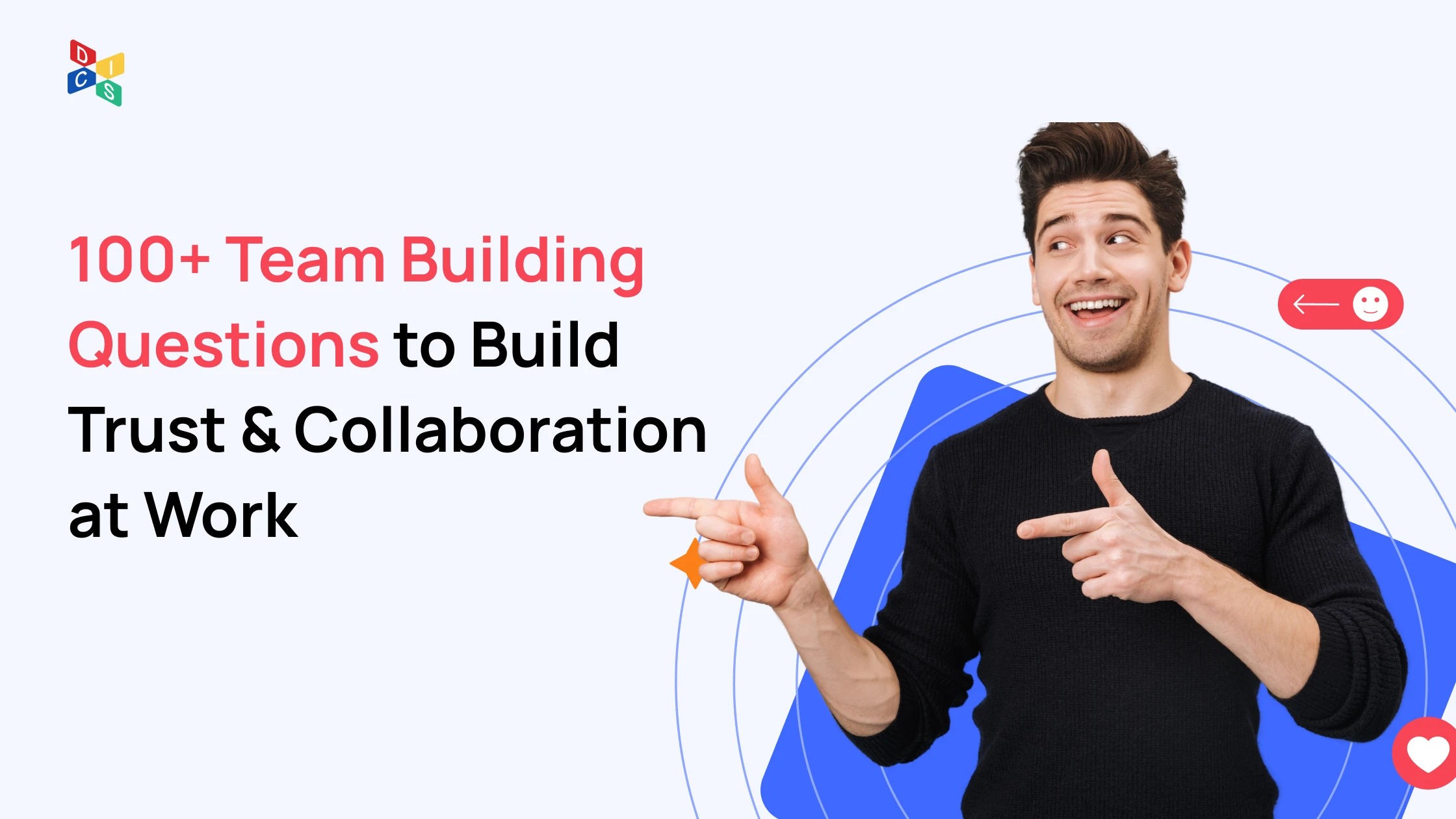 Self ExplorationDec 16, 2025
Self ExplorationDec 16, 2025100+ Team Building Questions to Build Trust & Collaboration at Work
Explore effective team building questions to boost connection, trust, and collaboration in your team. Engage everyone and strengthen your team's dynamics today!
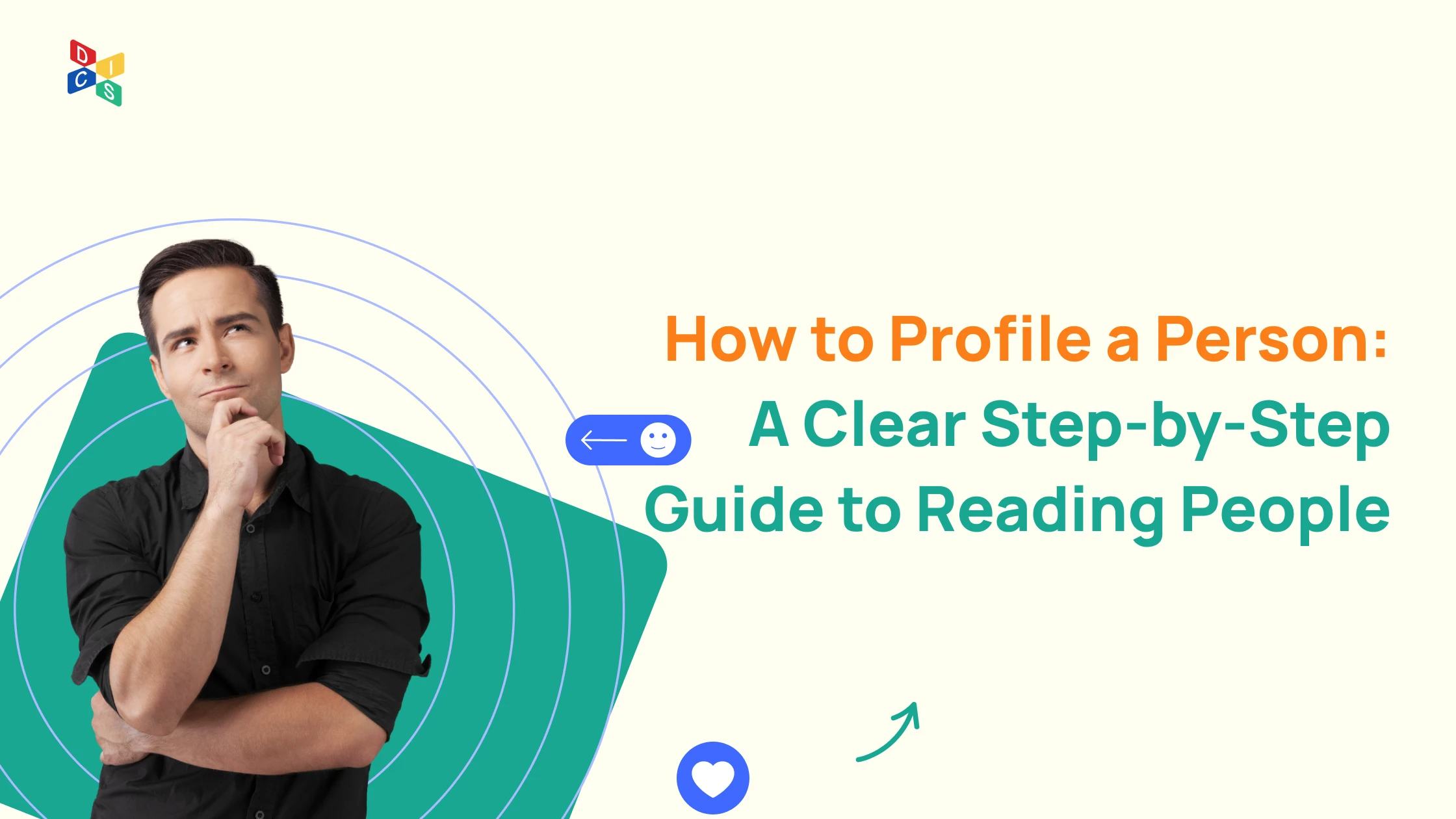 Self ExplorationDec 10, 2025
Self ExplorationDec 10, 2025How to Profile a Person: A Clear Step-by-Step Guide to Reading People
Learn how to profile a person step-by-step. Master practical techniques to read behavior, understand motives, and identify personality patterns accurately.
